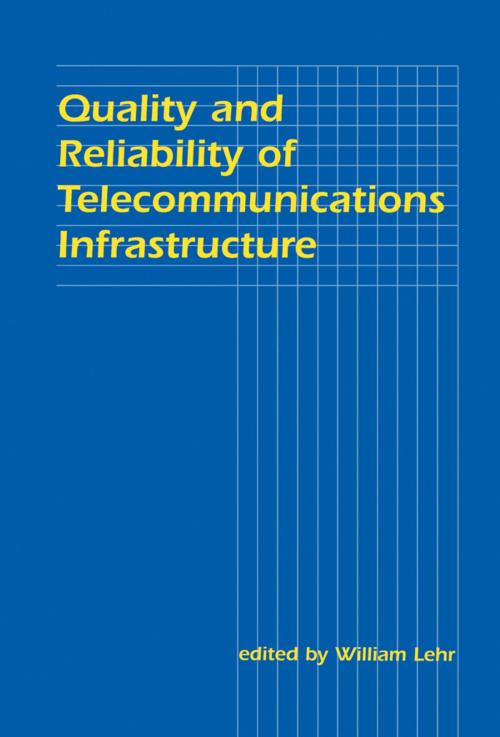Quality and Reliability of Telecommunications Infrastructure
Nonfiction, Science & Nature, Technology, Telecommunications, Reference & Language, Language Arts, Communication, Social & Cultural Studies, Social Science| Author: | ISBN: | 9781135447939 | |
| Publisher: | Taylor and Francis | Publication: | December 16, 2013 |
| Imprint: | Routledge | Language: | English |
| Author: | |
| ISBN: | 9781135447939 |
| Publisher: | Taylor and Francis |
| Publication: | December 16, 2013 |
| Imprint: | Routledge |
| Language: | English |
In the last decade, the technology, regulation, and industry structure of our information infrastructure (telephone services, cable and broadcast television, and myriad new data and information services) have changed dramatically. Since the break-up of AT&T's Bell System monopoly, telephone services in the United States are no longer purchased from a single firm. Advances in fiber optics, wireless communications and software-controlled switching are changing how communication services are provided. As the global economy grows more dependent on a hybrid mix of interconnected networks, public officials in the US and abroad are relinquishing control of the market. All of these changes are affecting the quality and reliability of the telecommunications infrastructure, but informed discussions of the public policy and economic issues are scarce. Deregulation and increased competition have lowered prices, but have service quality and reliability suffered? Do advanced network technologies which make it possible to offer a dizzying array of new services increase vulnerability to system-wide failures? Who should or is likely to bear the costs of increased -- or decreased -- service quality?
This volume tackles the economic and public policy issues raised by these difficult questions for an audience of industry executives, scholars, and policymakers. Leading scholars and analysts examine such issues as the effects of network ownership on incentives to invest in quality improvements and/or strategies for quality-differentiated pricing in tomorrow's broadband, integrated networks. They analyze the quality of current telecommunications networks and the impact of re-regulation on cable television quality. The contributions range from new microeconomic theory to new empirical research.
As such, the volume makes a valuable contribution to the public debate on network quality and reliability. It will be useful both as an introduction to newcomers and as a resource for more experienced researchers. As regulatory, industry and national barriers to integrated communications fall, these issues are likely to become even more important. The research presented here provides a solid foundation for further discussion.
In the last decade, the technology, regulation, and industry structure of our information infrastructure (telephone services, cable and broadcast television, and myriad new data and information services) have changed dramatically. Since the break-up of AT&T's Bell System monopoly, telephone services in the United States are no longer purchased from a single firm. Advances in fiber optics, wireless communications and software-controlled switching are changing how communication services are provided. As the global economy grows more dependent on a hybrid mix of interconnected networks, public officials in the US and abroad are relinquishing control of the market. All of these changes are affecting the quality and reliability of the telecommunications infrastructure, but informed discussions of the public policy and economic issues are scarce. Deregulation and increased competition have lowered prices, but have service quality and reliability suffered? Do advanced network technologies which make it possible to offer a dizzying array of new services increase vulnerability to system-wide failures? Who should or is likely to bear the costs of increased -- or decreased -- service quality?
This volume tackles the economic and public policy issues raised by these difficult questions for an audience of industry executives, scholars, and policymakers. Leading scholars and analysts examine such issues as the effects of network ownership on incentives to invest in quality improvements and/or strategies for quality-differentiated pricing in tomorrow's broadband, integrated networks. They analyze the quality of current telecommunications networks and the impact of re-regulation on cable television quality. The contributions range from new microeconomic theory to new empirical research.
As such, the volume makes a valuable contribution to the public debate on network quality and reliability. It will be useful both as an introduction to newcomers and as a resource for more experienced researchers. As regulatory, industry and national barriers to integrated communications fall, these issues are likely to become even more important. The research presented here provides a solid foundation for further discussion.















